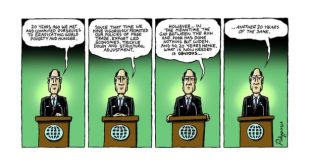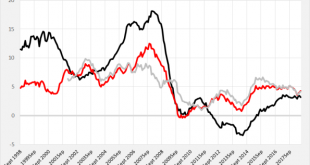Source: eurostat. What did the last decade teach us about (macro-)economics? The graph above is clear: * ‘Drunk driving’ financial crises do happen and cast a long shadow. * Even then, the response to these crises does matter. Eurozone sobriety led to a double dip (in case of unemployment: a double increase). After a crisis, sobriety is not the answer. Remember: the famous ant of the fable of the ant and the grasshopper was not an austerian as he invested in real assets all the time!...
Read More »Mistaken methodologies of science 1
from Asad Zaman The problem at the heart of modern economics is buried in the logical positivist methodological foundations created in the early twentieth century by Lionel Robbins. Substantive debates over the content actually strengthen the illusion of validity of these methods, and hence are counterproductive. As Solow said about Sargent and Lucas, you do not debate cavalry tactics at Austerlitz with a madman who thinks he is Napoleon Bonaparte, feeding his lunacy. Modern Macro Models...
Read More »Making economics relevant
from Maria Alejandra Madi This post was written by Carmelo Ferlito. He is a senior fellow at the Institute for Democracy and Economic Affairs (IDEAS) I taught economics in Malaysia for seven years. My students were mainly second and third year university students who attended my economics classes (microeconomic theory and policy and history of economic thought) after having already learnt the basic notions of macro and microeconomics. Most of my students were double majoring in economics...
Read More »Markov’s inequality (wonkish)
from Lars Syll One of the most beautiful results of probability theory is Markov’s inequality (after the Russian mathematician Andrei Markov (1856-1922)): If X is a non-negative stochastic variable (X ≥ 0) with a finite expectation value E(X), then for every a > 0 P{X ≥ a} ≤ E(X)/a If the production of cars in a factory during a week is assumed to be a stochastic variable with an expectation value (mean) of 50 units, we can – based on nothing else but the inequality – conclude that the...
Read More »Econ 101 – textbook warning
Twinkle, twinkle through 365 nights – on one battery!
Merry christmas and a happy new year! And a picture of an off the shelf heart shaped 2018 Christmas adornment which managed to twinkle 365/24/7 (even when not very bright) on one off the shelf battery, showing the power and the glory of modern contemporary off the shelf led and battery technology. Let’s embrace and welcome the next 365. And dump the last remaining 19th century technology totally outdated short lived energy wasting heat squandering incandescent light bulbs before the next...
Read More »Inhuman development
from David Ruccio There is a specter haunting capitalist development around the globe. In fact, the latest Human Development Report begins by naming that menacing apparition: The wave of demonstrations sweeping across countries is a clear sign that, for all our progress, something in our globalized society is not working. Different triggers are bringing people onto the streets: the cost of a train ticket, the price of petrol, political demands for independence. A connecting thread,...
Read More »The problem with ‘Divisia’ money
According to some economists, ‘Divisia money’ is, as a monetary aggregate, a superior and neoclassical alternative to the more often used M2 or M3 ‘single sum’ aggregates. But looking at such money aggregates in isolation prevents economists from analyzing monetary developments using the integrated and statistically coherent Flow of Funds framework which ties the growth of money to the growth of credit. Divisia money is not a sound alternative. The Flow of Funds are. The graph shows that...
Read More »RBC models — willfully silly obscurantism
from Lars Syll As a result of the three waves of new classical economics, the field of macroeconomics became increasingly rigorous and increasingly tied to the tools of microeconomics. The real business cycle models were specific, dynamic examples of Arrow–Debreu general equilibrium theory. Indeed, this was one of their main selling points. Over time, proponents of this work have backed away from the assumption that the business cycle is driven by real as opposed to monetary forces, and...
Read More »Foundations of probability 7-9
from Asad Zaman 7. Differentiating Between Choice and Preference 8. The Nature of Probability 9. Subjective Probability Does Not Exist
Read More » Real-World Economics Review
Real-World Economics Review







